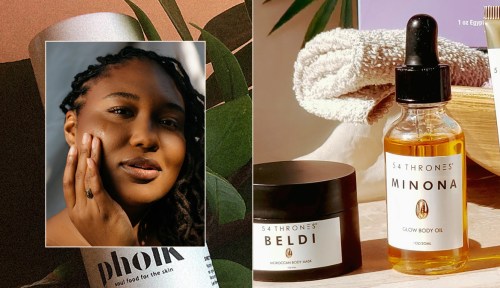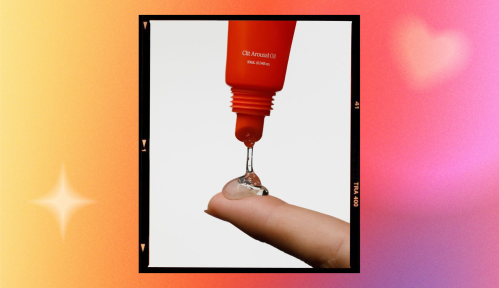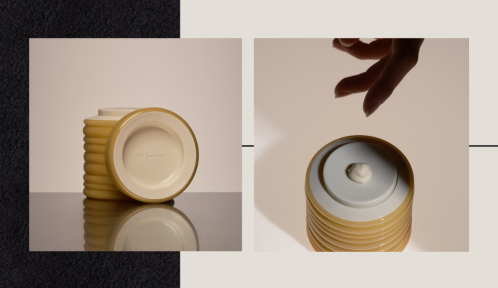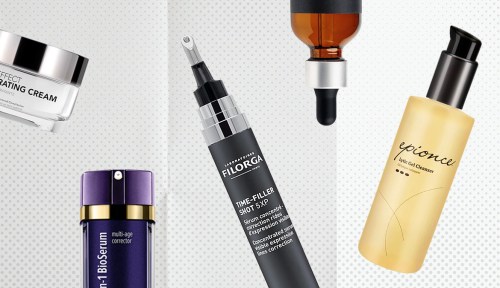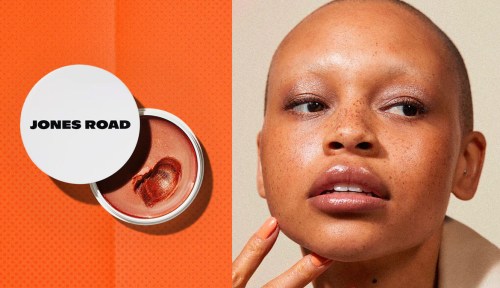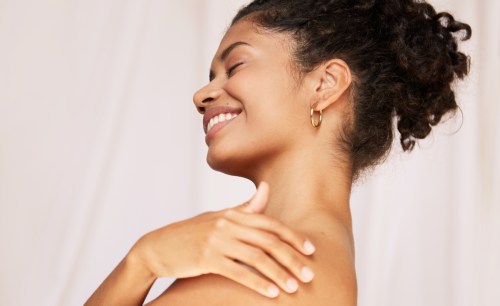Our editors independently select these products. Making a purchase through our links may earn Well+Good a commission
Like many Black Americans of African descent, I grew up removed from my heritage. Whenever my family and I visited Kenya, I’d become even more painfully aware of how far away I was from my culture—and with that, a huge part of my identity. I didn’t speak the language, my American accent always caused a laugh riot, and I didn’t know a lot of the music my family listened to. I felt disconnected from my family and myself, and was consumed with the things that made me different. For a while, I didn’t feel like I had the right to claim my Kenyanness.
Experts in This Article
Olowo-n’djo Tchala is the founder of clean beauty brand Alaffia.
As I got older and fell in love with beauty, I realized that the techniques and rituals I used to care for my hair and skin were saturated in Kenyan culture. Slathering oils on my scalp before styling, rubbing shea butter on my eczema flare-ups, wearing Bantu knots—those were all things that generations of Kenyan women did to feel their best, and connected me to my lineage in a way that I hadn’t previously realized.
That’s the power of African beauty, otherwise known as “A-beauty.” It’s rooted in traditions that date back centuries, and uses what the earth has to offer to make its people feel beautiful and cared for. Its ingredients come directly from nature and are treated with dignity and respect, and the way they’re used honors the vibrancy of the African people.
“A-beauty embodies the essence of Africa that is grounded by rich traditions, heritage, natural resources, and strong sense of community,” says Ijeoma Chimezie, host of The Subsaharan Beauty Podcast. “A-beauty is also rooted in simplicity and resourcefulness. The combination of these attributes is what makes it unique. The benefits don’t stop at the scientific level—it goes beyond that to represent an overall ethos of life which is rooted in simplicity and duality.”
In recent years, A-beauty brands have (finally) made their way onto western beauty shelves, bringing the best of Africa’s ingredients and rituals to users halfway across the world. Not only is this giving consumers an opportunity to learn about and experience the benefits of Africa’s beauty traditions, but it’s also helping African Americans, like me, feel closer to a culture that often feels far away.
A-Beauty’s formulations center on natural ingredients and centuries-old traditions
While the western world has long been guilty of lumping Africa’s countries together, each nation has its own distinct cultures, people, and traditions. The continent’s rich terrain births diverse ingredients that vary from place to place, and the way those ingredients are used in beauty practices are equally as varied.
“In Morocco, Amazigh women would gather with their beldi soaps in hammam spas to commune and spend time together, demonstrating its role within the community,” says Christina Funke Tegbe, founder of luxury skin and body-care brand 54 Thrones, who traveled around West and East Africa to learn about African ingredients. “And in Ethiopia, clarified butter can be used for cooking and as a hair moisturizer, showing its commitment to zero waste.”
In Somalia, qasil is “made from the dried and crushed leaves of gob trees to create a powder used for masks, shampoo, and cleanser, exemplifying the cross-functional use of materials,” says Tegbe. Zimbabwe has a rich tradition of using okra for its “hydrating properties to make face masks that target facial lines and wrinkles, illustrating the importance of multipurpose ingredients,” and in Sudan, “women preparing for marriage often perform a ritual practice known as dukhan, where the body is smoked with scented wood, exhibiting the power of tradition.”
Some traditional African ingredients are already common in the western world. Shea butter, for example, is found in numerous hair and skin-care products all over the world thanks to its moisturizing abilities. In Ghana, where it’s sourced from, Tegbe notes it’s used to “massage, moisturize, and stretch the limbs of babies,” an example of the vital role it plays in many families’ lives.
Baobab is extracted from the baobab tree in powder or oil form to deliver hydrating, soothing benefits to the skin and hair. Makeup brand Juvia’s Place uses the ingredient in seef-oil form in its Afterglow serum, and founder Chichi Eburu, who is dedicated to using African ingredients in her products, was specifically interested in baobab because it “has a high content of vitamin A, D, E, and F, which helps with rejuvenation and renewal of the skin,” she says.
Then, there’s moringa, an herb from the moringa tree that offers nourishing hair and skin-care benefits. As Well+Good previously reported, moringa is a fatty-acid-packed superfood that protects and heals your skin and hair. True Moringa founders Kwami Williams and Emily Cunningham, who use moringa oil in all of their products, figured out how to cold-press moringa seeds (the most unused part of the moringa tree) into a nourishing oil that rivals argan, jojoba, and shea.
The rituals that trickle into A-beauty are often deeply personal
A-beauty formulations are often derived directly from founders’ family histories. Niambi Cacchioli, founder of Pholk Beauty, grew up farming and in a household where Black women were extremely knowledgeable about how the earth could help nourish their skin.
“Everybody in our family understands how to nourish ourselves with healthy fresh produce on the inside, but we also learn to nourish our skin with really simple, wholesome ingredients on the outside,” she says, adding that her relatives would often take drugstore skin-care products that weren’t effective on their skin and modify them with natural ingredients to make them work.
Similarly, Tegbe’s journey to creating 54 Thrones also began with the Black women in her life—especially her aunt, whom she lovingly refers to as Mummy Fagbohun. “When I was a child, [Mummy Fagbohun] would find ways to persuade people traveling to America to carry tubs of shea butter to my family,” she shares. “I didn’t realize how important this act was until I got much older, but it was her way of ensuring we grew up with parts of our Nigerian heritage.”
I can relate to that realization: I, too, didn’t comprehend the value of the women in my family passing on Kenyan beauty rituals. In my youth, I was hyper-focused on what made me different: my accent, my attitude, the way that I was raised, etc… I was consumed by my otherness, and I worried that nothing would make me feel Kenyan.
When I was a teenager, I started experimenting with my mom’s go-to hair and skin-care practices as a way to find a routine of my own. I played around with aloe vera, shea butter, and moringa, and knowing that generations of Kenyans before me did the exact same thing made me feel more connected to my identity. Every time I used these ingredients, I was calling on an important part of my culture, which gave me solace. Knowing that I could use my beauty routine to organically connect to my heritage showed me, for the first time, that I didn’t have to “try” to be Kenyan—it’s a part of who I am.
Ethical sourcing and sustainability is central to A-beauty’s ethos
Respect for the Earth and African people is central to A-beauty’s ethos, which means that ethically-sourced ingredients and sustainable processes are top priorities for brands in this space. “Sustainability is so core to our cultural values,” says Cacchioli. “For Black founders, it really is our birthright, and it’s what brought a lot of us into skin care in the first place.”
“We pride ourselves on educating our community about these natural ingredients [derived from Africa],” she continues. “We’ve sought to share climate and conservation issues in Africa and I consider it an ongoing mission to educate that African land is not for pillaging or to be over-farmed, but if cared for, it has so much to offer the world that is truly unique.”
This focus on sustainability, in large part, could explain why American consumers have begun to flock toward A-beauty. In the wake of the pandemic, beauty buyers have begun to care increasingly more about where their products are coming from. According to data from NielsenIQ, the attributes people are looking for in their beauty products are natural ingredients (40.2 percent), respect for the environment (17.6 percent), and recyclable and reusable packaging (15.8 and 7.9 percent, respectively).
Those numbers are why Chimezie says she foresees the A-beauty trend picking up momentum. “I think [A-beauty] is going to gain the attention of beauty consumers seeking brands that are democratizing the beauty industry and are conscious about sustainability, ethical sourcing, and social impact—in essence, beauty as a source for good,” she says. Eburu echoes her sentiments, saying that “with people being more aware of their overall health and well-being, I see more people gravitating towards the rituals of A-beauty.”
Many brands that source ingredients from Africa also partner with cooperatives and artisans as a way to give back to the communities that have allowed them to share in their traditions. “An essential part of handcrafting Indigenous and wild-crafted ingredients are the customs of blessing the ingredients, which are often done by the more elderly or respected women in the Alaffia cooperatives, and it’s seen as a rite of passage,” says Olowo-n’djo Tchala, founder of beauty brand Alaffia, which is known for its African black soap-based formulations and founded a women-led shea butter cooperative in Togo, West Africa, in 2003.
Alaffia’s Empowerment Project takes the brand’s sales and invests them back into the Togo community, establishing initiatives that aim to help alleviate poverty and encourage gender equality. The artisans that 54 Thrones work with are at the forefront of the brand’s story so that Stateside consumers understand the faces and cultures behind its products, and the company provides jobs across the African continent. And another brand focusing on giving back is Hanahana Beauty, a skin-care line with formulations centered on shea butter from Ghana. The team created a “benefits circle” that supports the cooperatives it sources from in Ghana to improve economic, environmental, and self-sustainability for women within the shea trade. The brand compensates its cooperatives with double the asking price for shea butter per kilo, hosts biannual health-care check days for the Katariga community in Ghana, and partners with Tamale SDA Hospital and Drive For Health Foundation to provide hepatitis B vaccinations to women and children.
Bringing A-beauty to the U.S. doesn’t come without obstacles
Though the African cosmetics and beauty sector is predicted to experience a “historic expansion” and grow globally by $1.26 billion between 2021 and 2025 (with a 10 percent year-over-year increase), there are still certain struggles that founders face as they bring their products Stateside. Most notably, while the traditions and rituals at the center of their formulations have been around for generations, they’re still foreign to many American beauty buyers—many of whom think A-beauty products can only be used on melanated skin.
“One of the biggest misconceptions is that products made with traditional African ingredients, such as African black soap or other West African-derived ingredients, aren’t for everyone. They absolutely are,” says Tchala. There’s also a conception that A-beauty skin products exclusively target dark spots and hyperpigmentation (two conditions that are associated with an influx of pigment in the skin), which Cacchioli says is absolutely not the case. Her line, for example, contains a range of formulas that can be used on all skin types and concerns.
In general, securing funding can be a challenge for Black beauty entrepreneurs. According to a 2022 report from McKinsey, “Black brands in the beauty industry raise a median of $13 million in venture capital, substantially less than the $20 million that non-Black brands raise.” The report also found that “there’s a dearth of funding for Black beauty entrepreneurs at all stages of development, even when Black brands have proven to be more successful than their non-Black beauty start-up counterparts.”
“Access to capital and retail shelf space pose a barrier,” says Williams, noting that he faced these obstacles when bringing True Moringa to the U.S. “We need more investors and buyers from the [United States] who understand A-beauty and the unique challenges of building a brand from Africa, and can reinvest in younger brands from the continent.”
Thankfully, things are starting to change. A-beauty brands are making their way to western beauty shelves with the help initiatives by organizations like The Fifteen Percent Pledge, which has pushed retailers to dedicate at least 15 percent of their shelf space to products from Black-owned businesses. And we’re starting to see the belief that A-beauty is only for Black beauty buyers slowly become a thing of the past.
I’ve only had the privilege of experiencing a small fraction of the African continent, but the little I’ve interacted with has enriched my life beyond measure. Tegbe has been “traveling [around] Africa for 10 years now” and she, like her fellow A-beauty brand owners, wants the world to see—and fall in love with—the continent’s beauty offerings in the same way she has.
“The way I feel whenever I am on the continent is incomparable to any place in the world,” she tells me. “I wanted customers to feel that when they saw our products.”
My own love for A-beauty is much deeper than the gratification it gives me in the short and long term. It connects me to my past, and a part of myself I never thought I’d have access to. When I use the ingredients from my homeland, I feel linked to the Kenyan terrain and the thousands of women who came before me.
Shop our favorite A-beauty products
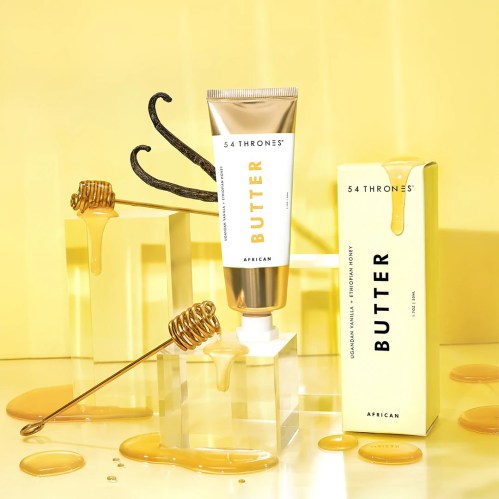
54 Thrones African Beauty Butter — $24.00
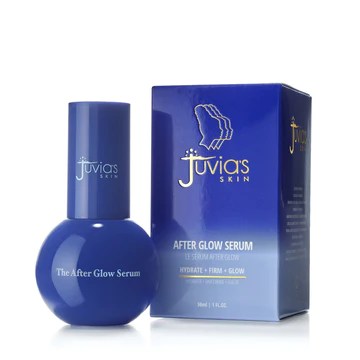
Juvia's Palace Afterglow Serum — $11.00
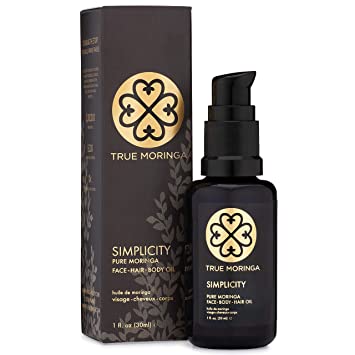
True Moringa Oil — $24.00
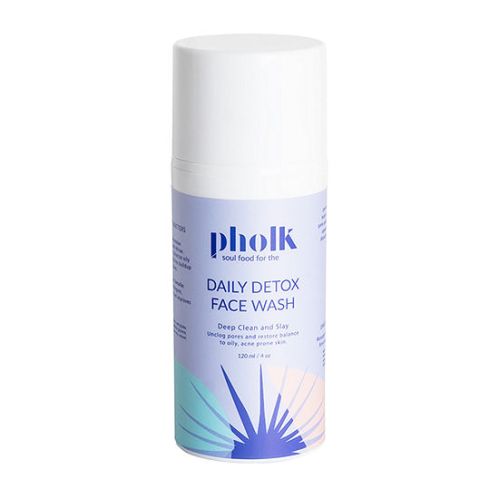
Pholk Beauty Daily Detox Face Wash — $18.00
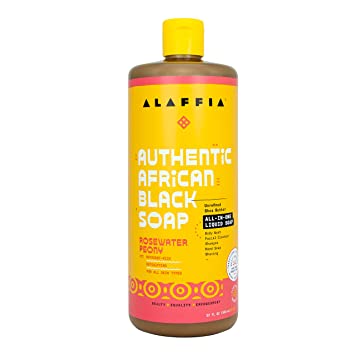
Alaffia Black Soap — $16.00
Sign up for the Well+Good SHOP Newsletter
Get exclusive deals on wellness, beauty, fitness, and food products that have been hand-picked by our editors.
Got it, you've been added to our email list.
